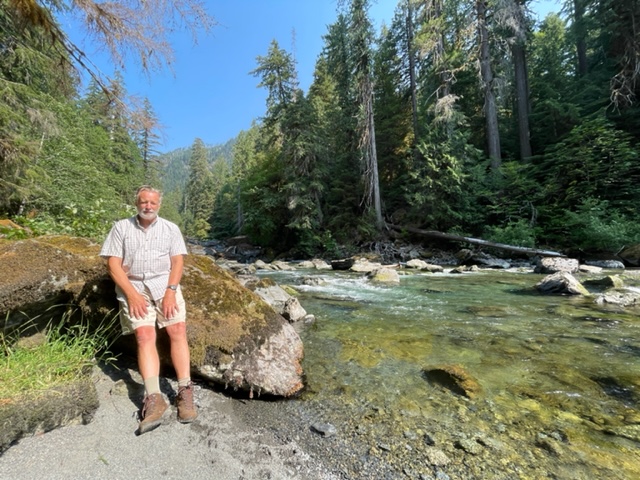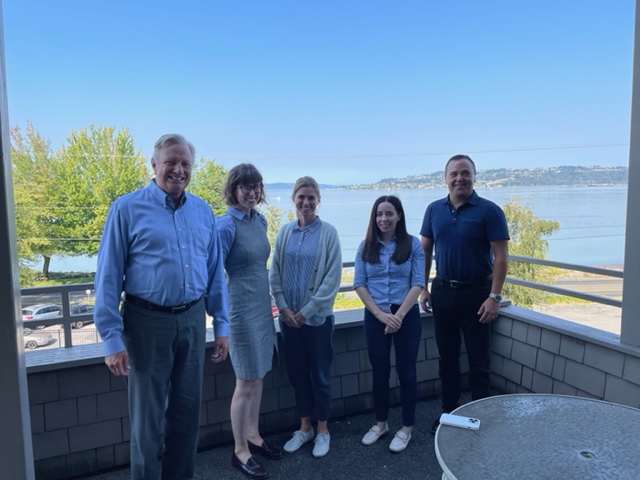Washington law firm responds to remote work challenges
Articles
Spotlight
View more from News & Articles or Primerus Weekly
By Brian Cox
Flexible, deliberate, and intentional.
Those are three words attorneys John Graffe and Chris Keay use often when talking about how their law firm is responding to the new world of remote work without sacrificing a sense of unity that is central to the firm’s culture.
Johnson Graffe Keay Moniz & Wick, LLP is a Washington law firm with 23 attorneys divided among offices in Seattle and Tacoma. Establishing and preserving a common identity as one law firm despite the geographical distance between the two offices has been an important objective of the firm’s leadership since the Seattle office was opened in the early 1980s.
“You have to be deliberate about it,” says Graffe, a lifelong Puget Sound area resident who has been with the firm since graduating from Willamette University School of Law in 1981.
As an example of its efforts to maintain cohesion as one law firm, he says the firm has never broken down the finances between the two offices.
“That’s the type of thing that can start driving people apart,” Graffe says.
The firm’s culture centers around the idea of “do the right thing.”
“It’s always been our North Star, so to speak, when we’re facing a decision,” says Graffe. “Figure out what’s the right thing to do. And most of the time that ends up being the right thing to do from a financial point of view and everything else.”
The firm has experienced very little turnover and is not big on policies and procedures. Its sick leave policy, for example, is unwritten and simple.
“If you’re sick, you leave so that you don’t get other people sick. Go home, get well, and come back to work when you’re ready,” says Graffe with a smile.
The ascending popularity of working remotely, however, has presented a unique challenge to the firm’s culture, says Keay, who runs the Tacoma office and has worked with Graffe for nearly 40 years, ever since coming out of law school at the University of Puget Sound in 1982.
“I think the culture of the firm is evolving, and we want to be ahead of that,” Keay says. “We want to shape that change, and it can be difficult.”
When the COVID-19 pandemic prompted lockdowns in cities across the country and businesses scrambled to find solutions to working remotely, Johnson Graffe Keay Moniz & Wick was well positioned to make the transition thanks to fortuitous timing.
Following the loss of the firm’s in-house tech, an outside vendor was brought in to assess the firm’s technology needs and many of its systems were subsequently upgraded.
“We had made some pretty hefty technological changes prior to COVID, thank goodness,” says Keay. “That really saved our neck.”
A point echoed by Graffe.
“We realized we needed to make a lot of improvements, including security so that everybody could work remotely,” says Graffe, “and that was all in place when COVID hit so we were able to transition from a technical point of view to remote work very seamlessly.”
When people first began working from home, Keay instituted the practice of a conference call every morning with his primary associate and paralegal to discuss the work ahead of them that day.
“I need that daily contact,” says Keay. “You have to be intentional in maintaining relationships. You don’t want to drift into a situation where you’re not having that kind of regular contact.”
The popularity of working remotely has burgeoned in the wake of the pandemic, and Keay makes an important distinction between voluntary and involuntary remote work.
“We had involuntary remote work for almost two years,” he says, “and now we’re transitioning into a different period where we’re seeing a lot of folks electing or asking to be able to work remotely.”

The trend toward working remotely part-time had actually already started in the Seattle office, where commutes involving buses, trains, and ferries could be torturous, but the pandemic accelerated the demand, according to Graffe, and the firm has adapted accordingly.
“What I’ve realized with remote work is that it’s not one size fits all,” says Graffe. “What works for some people, doesn’t work for others and you have to allow for that flexibility. Most have chosen to work remotely because there’s been some personal change in their life and we wanted to accommodate that.”
One paralegal now works from Texas, where she moved to be near family. A longtime staff person continues to work for the firm from Arizona. A former senior associate is now of-counsel, working in Oklahoma. A current associate who recently got engaged is relocating to Colorado for a few years while his future wife finishes her Ph.D. but will stay with the firm because he can work remotely.
“We kept them on to work remotely and it’s worked out,” says Graffe, who himself often works from home because he lives on an island where the ferry service has been dramatically cut back in response to COVID.
“If we hadn’t allowed remote work, we would have had to replace people,” adds Graffe. “And turnover is hard. It’s time consuming. It’s expensive, and you never know what you’re getting.”
While the majority of staff and attorneys still work in the office, Keay says the shift toward working remotely has implications for how law is practiced in the present and into the future. He points to the need for office space, one of the largest expenses for many law firms, as only one example.
“We are not going to need as big a footprint in the future as we have currently,” he says. “We have to adapt and evolve with the times we live in.”
While remote work brings advantages such as more flexible schedules, the avoidance of long commutes, the retention of valuable employees, and potential cost savings in rent, it also presents challenges. Possibly the greatest challenge deals with creating connections and forging bonds among employees, two elements fundamental to a firm’s culture. How will new people who join the firm build critical relationships with those who have been with the firm for years if they rarely meet in person?
“We are inherently social creatures,” says Keay. “I think there’s a lot of communication that happens not only in person but during the course of the day working with and around people. We get to know them at a different level.”
The challenge is partly generational, according to Keay and Graffe.
“When we were young lawyers together, we didn’t have email, didn’t have cell phones, but we were all together at the Lotus for lunch,” says Graffe. “That’s how we got to know each other and became friends.”
As the leading edge of a generation that grew up with technology, however, young lawyers are just as comfortable communicating by text and instant messages, says Graffe.
And Keay sees clearly that as senior attorneys, he and the other partners bring a certain bias to their view on the firm’s culture. As young lawyers in the 1980s, it was understood that everyone showed up at the office for work; everyone dressed a certain way; everyone put in extra hours to ensure the partners were satisfied with their performance.
“That’s our frame of reference and we’ve had to be flexible in how we see things and how we think about this,” says Keay. “I can’t say with 100 percent confidence that the culture of the firm is going to necessarily evolve in a good way. I can’t say it’s going to evolve in a bad way. I just don’t know. That’s the piece that’s hard for me.”
Adds Graffe: “All we know is that it’s going to evolve, but where it’s going to go, who knows.”
One aspect that Graffe has seen evolve is factors young lawyers consider when looking to join a law firm or staff make in deciding to stay. Once salary was the driving factor in deciding to accept or retain a position, and then benefits became a strong consideration, especially as health care costs rose. Now, Graffe says, the opportunity to work remotely is a significant feature lawyers and staff alike are seeking.
“It’s a quality-of-life issue,” says Keay. “Young lawyers want to know do I have to sell my soul to this firm and spend every day and weekend working or am I going to have some latitude for family time or recreation.”
“We’ve always tried to maintain a work-life balance,” says Graffe, who freely admits he doesn’t miss the air travel that the job once required.
Other contributing factors to the shift to remote work lie outside the firm, including clients and the courts.
“The institutions and the people we interact with on a day-to-day basis are all doing the same thing,” says Graffe, whose practice involves a lot of medical defense. “So, it’s not like we’re outliers.”
The courts in King County have led the country in conducting trials on Zoom, according to Graffe, and there is currently a movement to change civil rules statewide to allow Zoom trials indefinitely. Jury selection on Zoom is likely to be held indefinitely as well, and a Supreme Court order remains in place presuming depositions occur remotely.
When Keay and Graffe look down the road to how remote work at law firms may evolve, they admit to being unable to read the tea leaves.
“The biggest challenge is trying to guess how we are going to work five or 10 years from now and preparing our younger people for that,” says Graffe. “I don’t know what it’s going to be. I just know it’s not going to be what it was like five or 10 years ago.”

Yet, says Keay, “the problems that call for the help of lawyers are not going to change too much.” That seems certain.
“Human nature is not going to change,” he says. “The question is how do we best address the needs that we know are going to be out there. I think at the end of the day the problems that we’re working on, the problems that we’re asked to solve and resolve, are going to be the same. It’s just how we go about it that may be different.”
Keay is confident a law firm’s success, whatever the technological changes to come, will continue to rely on competence, caring about clients, and diligence.
“If you have those factors and you have a good team working with you, you’re going to be fine in five years, ten years, whatever,” says Keay.
Graffe adds: “If you have good people and you treat them fairly, you’ll be okay.”